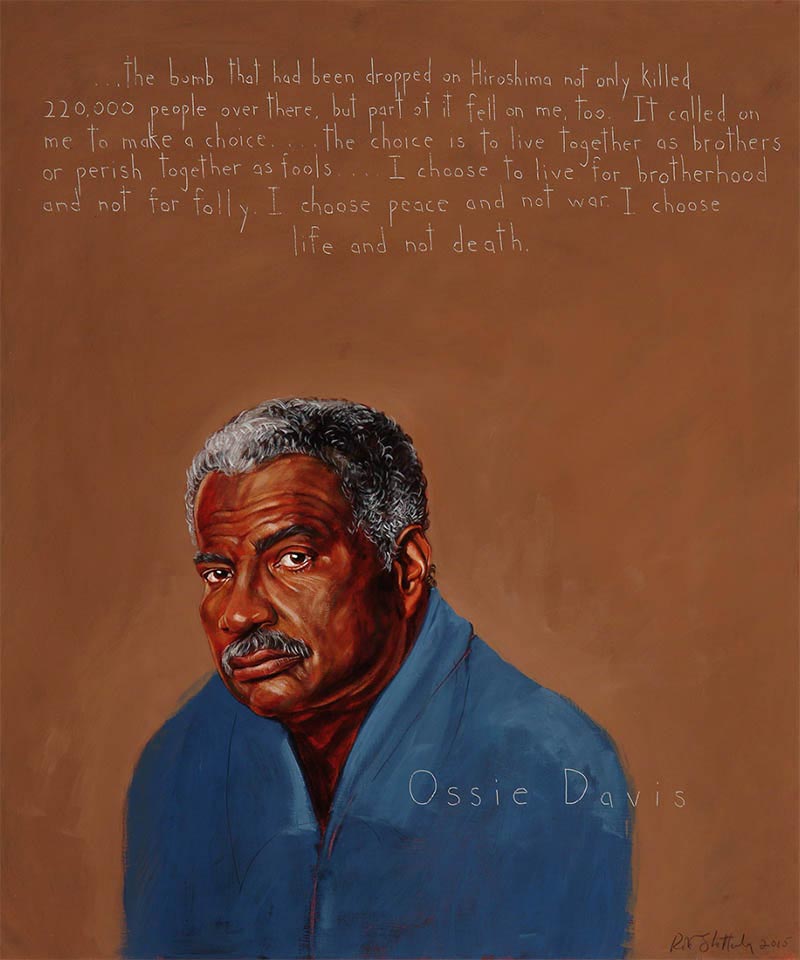
Ossie Davis
Actor : 1917-2005
“…I am a veteran…. the bomb that had been dropped on Hiroshima not only killed 220,000 people over there, but part of it fell on me, too…. It called on me to make a choice…the choice is to live together as brothers or perish as fools…I choose to live for brotherhood and not for folly. I choose life and not death.”
Biography
When Ossie Davis spoke out against injustice, his words carried the weight of experience. Davis, a distinguished stage, screen, and television actor, devoted his life to the fight for civil rights and progressive change.
In 1935, Davis hitchhiked from his home in rural Georgia to enter Howard University in Washington, D.C. He studied drama with the intention of becoming a playwright. Davis began acting in 1939 in Harlem, where he met the poet Langston Hughes, black socialist reformer W.E.B. DuBois, and other leading figures of the era.
After serving as a surgical technician in Liberia in World War II, Davis returned to New York. He debuted on Broadway in 1946 in “Jeb,” a play about a soldier coming home from the war. Davis’s co-star was Ruby Dee, whom he married two years later. It was the start of a loving partnership that spanned more than 50 years.
Davis and Dee were soon swept up in social unrest provoked by the start of the Cold War and mounting tensions over racial injustice. The couple spoke out against McCarthyism and stood by people like the singer Paul Robeson, whom other black celebrities had condemned for his pro-Communist views.
Deeply engaged in the civil rights movement, Davis and Dee were masters of ceremonies for the March on Washington in 1963, where Martin Luther King, Jr., delivered his “I Have a Dream” speech. Malcolm X was among their friends and Davis gave the eulogy following the black leader’s assassination in 1965. Davis had the courage to praise Malcolm X at a time when most of the white world vilified him, even in death. Said Davis, “Many will ask what Harlem finds to honor in this stormy, controversial and bold young captain…. And we will…say to them…. Malcolm was our manhood, our living, black manhood!”
Davis and Dee continued their creative work, which ranged from the television series Roots: The Next Generation to Spike Lee films including Do the Right Thing and Jungle Fever. Both also wrote plays and screenplays and appeared in numerous television shows. They published their dual autobiography, In This Life Together, in 1998 in celebration of their 50th wedding anniversary. Davis practiced his art and activism right up to the end. He died in February 2005 while working on a movie.
Programs
Americans Who Tell the Truth (AWTT) offers a variety of ways to engage with its portraits and portrait subjects. Host an exhibit, use our free lesson plans and educational programs, or engage with a member of the AWTT team or portrait subjects.

Education
AWTT has educational materials and lesson plans that ask students to grapple with truth, justice, and freedom.

Exhibits & Community Engagement
AWTT encourages community engagement programs and exhibits accompanied by public events that stimulate dialogue around citizenship, education, and activism.